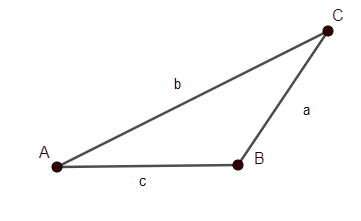Question
Question: In any \(\Delta ABC\), prove that \(\dfrac{\sin \left( B-C \right)}{\sin \left( B+C \right)}=\dfra...
In any ΔABC, prove that
sin(B+C)sin(B−C)=a2b2−c2
Solution
Hint: Try to simplify the left-hand side of the equation given in the question using the formula of sin(X-Y) followed by the application of the sine rule and the cosine rule of a triangle.
Complete step-by-step answer:
Before starting with the solution, let us draw a diagram for better visualisation.

Now starting with the left-hand side of the equation that is given in the question. To start the simplification, we need to use the formula sin(X-Y) = cosYsinX – sinYcosX.
sin(B+C)sin(B−C)
=sinBcosC+cosBsinCsinBcosC−cosBsinC
Now we know, according to the sine rule of the triangle: sinAa=sinBb=sinCc=k and in other terms, it can be written as:
ka=sinAkb=sinBkc=sinC
So, applying this to our expression, we get
=kbcosC+kccosBkbcosC−kccosB
Now we will take k1 common from all the terms. On doing so, we get
=k1(bcosC+ccosB)k1(bcosC−ccosB)
Now from the conditions of sine rule, we know that k is a finite number, so we can say that k1 is finite. Therefore, cancelling k1 from denominator and numerator, our expression becomes:
=bcosC+ccosBbcosC−ccosB
Now according to the cosine rule of a triangle:
cosA=2bcb2+c2−a2cosB=2aca2+c2−b2cosC=2abb2+a2−c2
So, using this in our expression, we get
=(2ab2+a2−c2)+(2aa2+c2−b2)(2ab2+a2−c2)−(2aa2+c2−b2)
Now we will take 2a1 common from all the terms and cancel it. On doing so, we get
=b2+a2−c2+a2+c2−b2b2+a2−c2−a2−c2+b2
=2a22b2−2c2
=a2b2−c2
The left-hand side of the equation given in the question is equal to the right-hand side of the equation. Hence, we can say that we have proved the equation given in the question.
Note: Be careful about the calculation and the signs while opening the brackets. A general mistake that students make is completely wrong. Also, you need to learn the sine rule and cosine rule, as they are often used.
